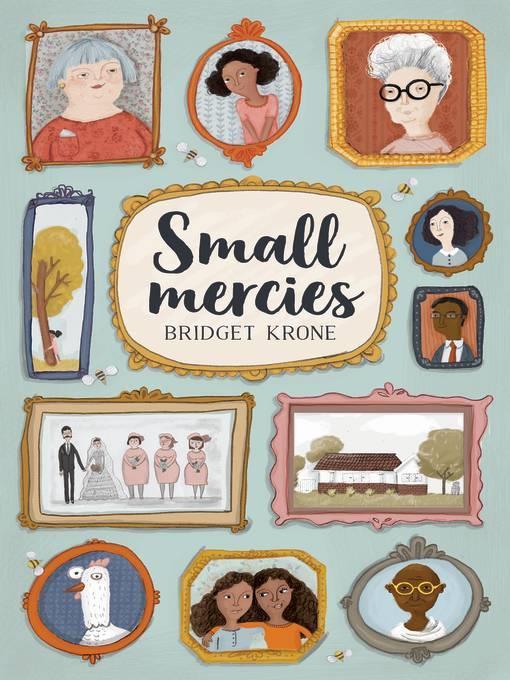
Small Mercies
فرمت کتاب
ebook
تاریخ انتشار
2020
Lexile Score
820
Reading Level
3-4
نویسنده
Karen Vermeulenناشر
Catalyst Pressشابک
9781946395504
کتاب های مرتبط
- اطلاعات
- نقد و بررسی
- دیدگاه کاربران
نقد و بررسی

February 3, 2020
Mercy, a dark-skinned child, lives in modern-day South Africa with her foster mothers, two eccentric elderly sisters who took her in after her mother’s death, when she was five. Mercy has been safe and comfortable in the years with Aunt Mary and Aunt Flora, but financial woes, Flora’s worsening Alzheimer’s, and a pushy real-estate developer determined to turn their property into cluster housing plague the family, leaving Mercy fearful that she’ll be taken from her home. With the support of her community, Mercy finds the courage to share her fears and ask for help. Mercy’s foster mothers have a clear distrust of government systems, teaching Mercy to be wary of people such as social workers, opting instead to rely on self-advocacy, friends, and neighbors for support. Characters of all ages populate this debut’s pages, but, disappointingly, the children are less engaging and memorable than the adults, whose big personalities jump colorfully off the page. There are skillful moments in which Krone touches on themes, such as belonging and connection, with brilliant clarity. Ultimately, though, too many subjects, from the state of the foster care system to environmentalism and the plight of bees, vie for attention, lessening the overall effect of the narrative. Ages 8–12.

February 1, 2020
Gr 4 Up-In contemporary Pietermaritzburg, South Africa, Mercy Adams lives in fear of a social worker appearing at her doorstep and taking her away from Aunt Flora and Aunt Mary, the two elderly sisters who have been her foster mothers since she was very young. To outsiders, she knows their life wouldn't be considered "normal"-Aunt Mary never hesitates to write Mercy absurd excuses to get out of her sixth grade responsibilities ("she has a bone in her leg," a cross country excuse reads), their ramshackle house is falling apart, and worst of all, Aunt Flora's memory has started to fade due to Alzheimer's. When a housing developer makes aggressive attempts to buy their house, Aunt Mary declines the offer and instead takes in a lodger, Mr. Singh, to raise some extra money. Mr. Singh tells Mercy stories about his "friend," Mohandas (Gandhi), that teach her to appreciate the unforeseeable significance of small acts in building a better world. Mercy is a winning protagonist who is by turns anxious, observant, and brave. South Africa is represented in its diversity: Mercy is mixed race, her aunts are white, and neighbors, classmates, and community members are from a range of racial and cultural backgrounds. Short, episodic chapters in the book's first half build to an emotionally compelling conclusion that is rich in insights about community, family, and social action. VERDICT This novel has a gentle, timeless feel, complex secondary characters, and quirky humor. A heartfelt, human, and wise addition to middle grade shelves.-Elizabeth Giles, Lubuto Library Partners, Zambia
Copyright 2020 School Library Journal, LLC Used with permission.

Starred review from December 15, 2019
Set in post-apartheid Pietermaritzburg, South Africa, this realistic story traces protagonist Mercy's quest to speak up for truth and, consequently, for herself. Eleven-year-old Mercy has lived with her two elderly foster mothers--"Aunt Flora" and "Aunt Mary" McKnight--since she was orphaned at the age of 5. Although their home is filled with love, the McKnight sisters are so poor that they reuse tea bags as many as four to five times and most of the furniture has been sold. To make matters worse, Aunt Flora is slowly losing her memory to Alzheimer's, and their beloved house seems to be falling apart just as a greedy housing developer is eying their property. Painfully shy and reserved, Mercy struggles to cope with her school assignments and her complicated home life as she tries very hard not to stand out. When Mr. Singh moves into the McKnight house as a lodger, his stories about Gandhi's peaceful struggle for independence inspire Mercy to stand up for herself. Krone's characters are diverse, convincing, and full of life. The McKnight sisters are white, Mercy has dark skin and is likely of mixed heritage, Mr. Singh is Indian, and Mercy's classmates are representative of South Africa's diverse communities. The story stands on its own, but readers unfamiliar with South Africa might also benefit from concurrent research or discussion about South African history, cultures, and languages. Sensitive, funny, and tender. (Fiction. 8-12)
COPYRIGHT(2019) Kirkus Reviews, ALL RIGHTS RESERVED.

























دیدگاه کاربران